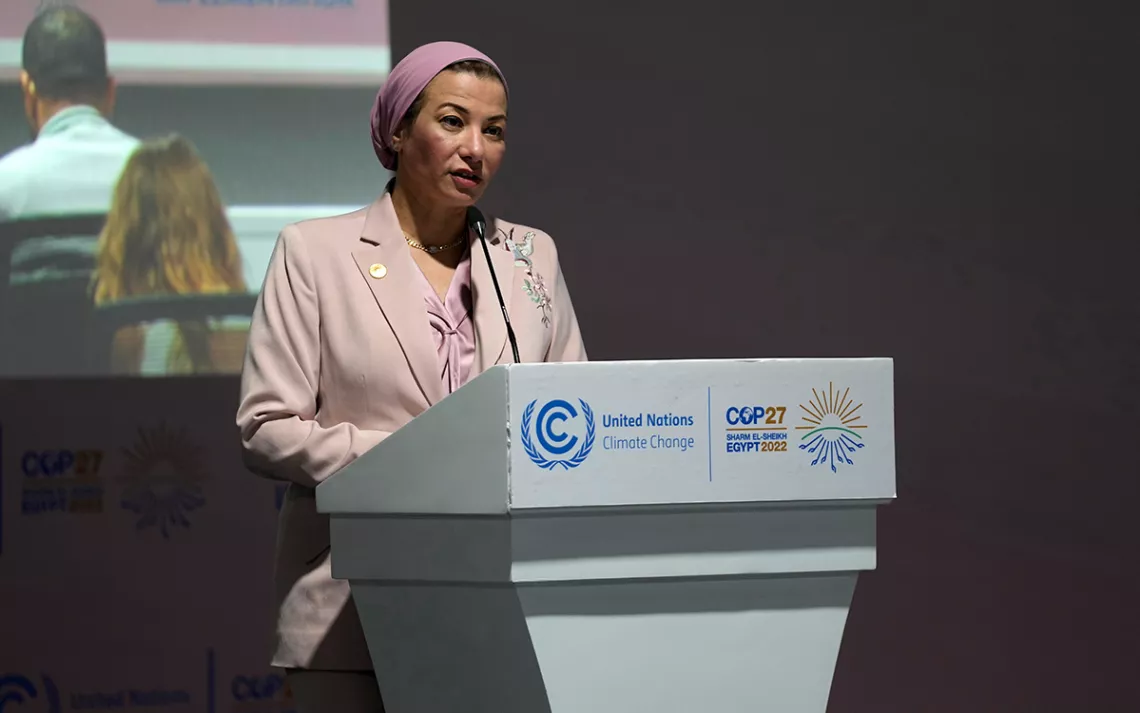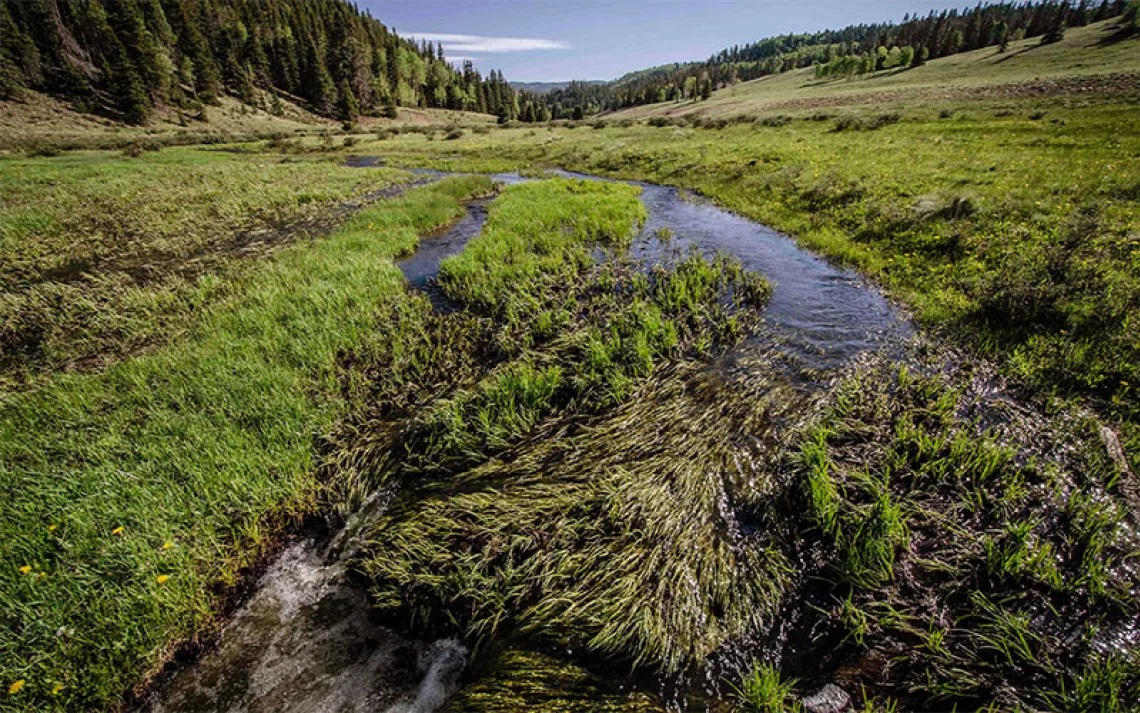World Leaders Call for “Paris Moment” on Biodiversity Day at COP27
International meeting highlights the interconnectedness of climate change and biodiversity loss

Egypt's environment minister, Yasmine Fouad, speaks at a session on biodiversity at the COP27 UN Climate Summit on November 16 in Sharm el-Sheikh, Egypt. | Photo courtesy of PeterDejong/AP
As climate negotiations wrapped up at this week’s United Nations Climate Change Conference in Sharm el-Sheikh, Egypt, leaders highlighted another critical planetary function that goes hand-in-hand with climate change: biodiversity. Its role in supporting society has never been more realized. From air and water purification to breakthroughs in medical science, biodiversity—or the variety of life on Earth—touches every level of the way people live, and it's in a dire state.
Earlier this year, UN Secretary-General António Guterres warned that species extinction rates are hundreds of times higher than what they've been in the past 10 million years. More recently, the Living Planet report, a biannual assessment put out by the World Wildlife Fund, found that the vast majority of studied vertebrate populations have decreased by nearly 70 percent in the last half a century. Biodiversity is not about a single species or ecosystem, but rather the interconnectedness of all living things.
What's needed now, according to leaders and experts, is a concerted effort by governments and corporations to tackle both climate change and biodiversity loss simultaneously. The United Nations has therefore dedicated an entire day of COP27 to biodiversity.
“We cannot deal with solutions to climate change, and all negotiations going on, in isolation from biodiversity,” said Elizabeth Mrema, the executive secretary of the UN Convention on Biological Diversity (CBD), in a press briefing as the day got underway. “When we say we expect to have a Paris moment for nature, it's because of the importance of not just climate change, but also biodiversity."
The day had three main sections: Present, Hope, and Vision. The first took stock of the current state of biodiversity, what has been lost, and how biodiversity and climate change intersect. The spotlight was on communities that have been particularly impacted by the effects of climate change, which tend to be in the Global South.
“My community was hit by two cyclones in just one year, and our [entire] city was completely destroyed,” said Adriana da Silva Maffioletti, a young activist from Brazil, to UN News. “We don’t want to live like this anymore. We need a safe space; we need a safe planet.”
The Hope portion focused on solutions. It's here where experts honed in on the importance of “ecosystem-based approaches” to deal with the effects of climate change and biodiversity loss. Moderators, including Neville Ash from UN Environment World Conservation Monitoring Centre and Razan Al Mubarak, the president of the International Union for Conservation of Nature, led some of the discussions.
Examples of nature-based solutions include reforming agricultural practices in Africa to include agroforestry, where crops are diversified, trees are planted, the soil is tilled less, and cover crops are used to reduce erosion. The end result, say representatives from the IUCN, is increased food production, fewer chemicals, and healthy soils and habitat for wildlife. Another strategy builds off the COP26 Declaration on Forests and Land Use, where 137 countries committed to reducing deforestation. Conserving forests, said leaders in their pledge, is critical to meeting the goal to keep global temperatures below 1.5°C, as outlined in the Paris Agreement.
John Kerry, who is the special presidential envoy for climate, spoke during an oceans and climate segment, where he announced the initial group of countries that joined the US-led Ocean Conservation Pledge. The initiative aims to conserve at least 30 percent of the ocean by 2030. Countries include Australia, Canada, Malta, and Costa Rica.
“We are committed to ensuring that the Parties cooperate effectively to accelerate action at the scale and pace needed through research, development, demonstration, and deployment of climate technologies,” said Kerry when speaking about funding two UN technology programs.
A coalition of scientists, Indigenous groups, and NGOs also used a part of the day to warn leaders of “catastrophic” biodiversity loss if no action is taken. Over 350 leaders called on governments to prioritize the finalization of an agreement at the UN biodiversity conference, or COP15, next month in Montreal. What's needed, they said, is the complete halting of biodiversity loss by 2030 and a “nature positive” trend, where biodiversity is recovering and being restored, in the years after.
Their call was supported by a new survey unveiled during the event that showed a lack of support and disincentives are drastically undermining the goal of stemming biodiversity loss.
“The science has been very clear: Human activities are driving accelerating biodiversity loss, which in turn is undermining our ability to limit global warming to 1.5°C,” said Marco Lambertini, director general of WWF International, in a press release. “Entire ecosystems are heading toward collapse, with devastating consequences for people and the planet.”
Next, leaders from the World Bank, Bezos Earth Fund, and the Organization for Economic Co-operation and Development focused on the urgency needed to reverse biodiversity loss and rapid climate change. The emphasis was on financing and policy, but activists also used the vision portion to urge leaders to act swiftly to address the combined threats of biodiversity loss and climate change. One country in particular, the United Kingdom, took the opportunity to announce over $35 million in seed financing to help boost nature-based solutions.
The resounding message was that lofty goals are pointless without effective policies to implement them. Industries will need to work across sectors and countries to enact the targets needed to protect both nature and the climate, they argued.
The day culminated in a rallying cry urging leaders to adopt a global biodiversity framework, which is the intent of the COP15 next month. Many of the same delegates in Egypt will be in Canada to call for a “Paris Agreement” for nature.
“We can find our way out of the planetary crisis we face, but to do so we will need to change our way of thinking and start telling new stories about what is possible and what is important,” said Elizabeth Wathuti, a Kenyon climate advocate and the founder of the Green Generation Initiative. “A future with a stable climate, clean air, clean water, and food security for all is possible. And international cooperation and solidarity are how we are going to achieve it.”
 The Magazine of The Sierra Club
The Magazine of The Sierra Club



